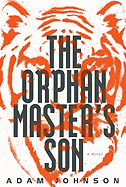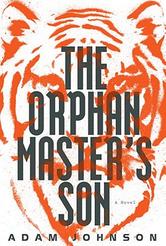
 Jun Do, the eponymous orphan master's son of Adam Johnson's second novel (after 2004's Parasites Like Us), picks out the names for the orphanage's wards from a list of 114 North Korean revolutionary martyrs, which is also how he got his own name. "The revolutionaries in Pak Jun Do's unit didn't trust him because he was descended from an impure blood line," he explains to his partner in a commando squad that kidnaps Japanese citizens at the whim of Kim Jong Il and other high-ranking officials. "To prove his loyalty, he hung himself."
Jun Do, the eponymous orphan master's son of Adam Johnson's second novel (after 2004's Parasites Like Us), picks out the names for the orphanage's wards from a list of 114 North Korean revolutionary martyrs, which is also how he got his own name. "The revolutionaries in Pak Jun Do's unit didn't trust him because he was descended from an impure blood line," he explains to his partner in a commando squad that kidnaps Japanese citizens at the whim of Kim Jong Il and other high-ranking officials. "To prove his loyalty, he hung himself."
Such morbid fatalism pervades every scene in The Orphan Master's Son. Even at its funniest--and there's a lot of humor here--there's an underlying realization that one false move can send a character to the prison camps; when things go wrong, characters scramble to come up with plausible stories that will excuse the failure without incurring the wrath of the "Dear Leader." (When the second mate on Jun Do's spy ship steals the life raft and defects, Jun Do allows the rest of the crew to close a dying shark's jaws on his arms to make their cover story of a failed rescue convincing.)
As Jun Do's surreal odyssey builds up to a brazen impersonation of the legendary Commander Ga ("a man who'd led six assassination missions into South Korea, won the Golden Belt in taekwondo, and purged the Army of all the homosexuals"), Johnson increasingly turns to new voices, including a series of over-the-top government propaganda bulletins--"Citizens, gather 'round your loudspeakers!"--that distort the story in Kim Jong Il's favor. Yes, the Dear Leader is an actual character in the second half of the book; he obviously knows that Jun Do isn't Commander Ga, but it amuses him to accept the deception, which means all of Pyongyang must play along--including Ga's wife, the greatest actress in North Korea, Sun Moon.
"Having a character who can do anything he desires at any moment he wishes would normally be bad for storytelling," Johnson has said in a recent interview. "But the truth of North Korea is that such a character exists, and it was my job to capture him." He succeeds admirably; though there's a whiff of Dr. Evil farce to some of Kim Jong Il's scenes, Johnson recognizes that no man could maintain such absolute power without a core of cunning and ruthless competence. Though the split time structure of the novel's back half means readers can be pretty sure ahead of time what will happen, Johnson guarantees that they'll want to see just how it happens... and how many different ways The Orphan Master's Son can tell it.--Ron Hogan
Shelf Talker: The death of Kim Jong Il gives the novel an obvious timeliness, but Johnson's account of life under a totalitarian regime has the power to outlive historical circumstance.

